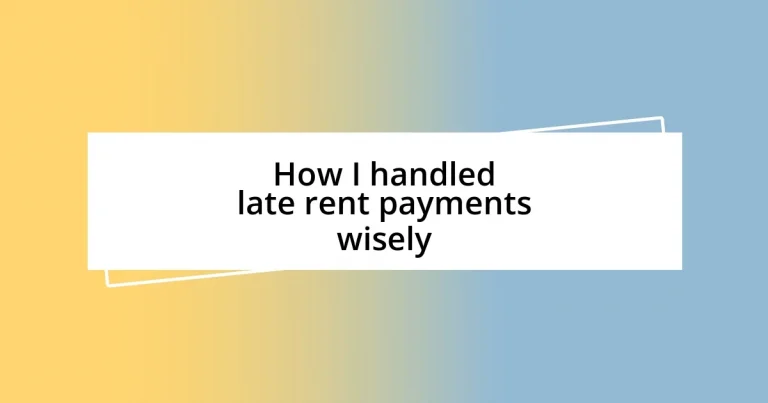Key takeaways:
- Empathy and open communication are crucial for addressing late rent payments, fostering trust and understanding between landlords and tenants.
- Implementing a fair late payment policy, including grace periods and flexible payment options, can significantly improve tenant relations and reduce stress.
- Encouraging timely payments through regular check-ins and incentives, such as discounts for early payments, can empower tenants and enhance their engagement with financial responsibilities.
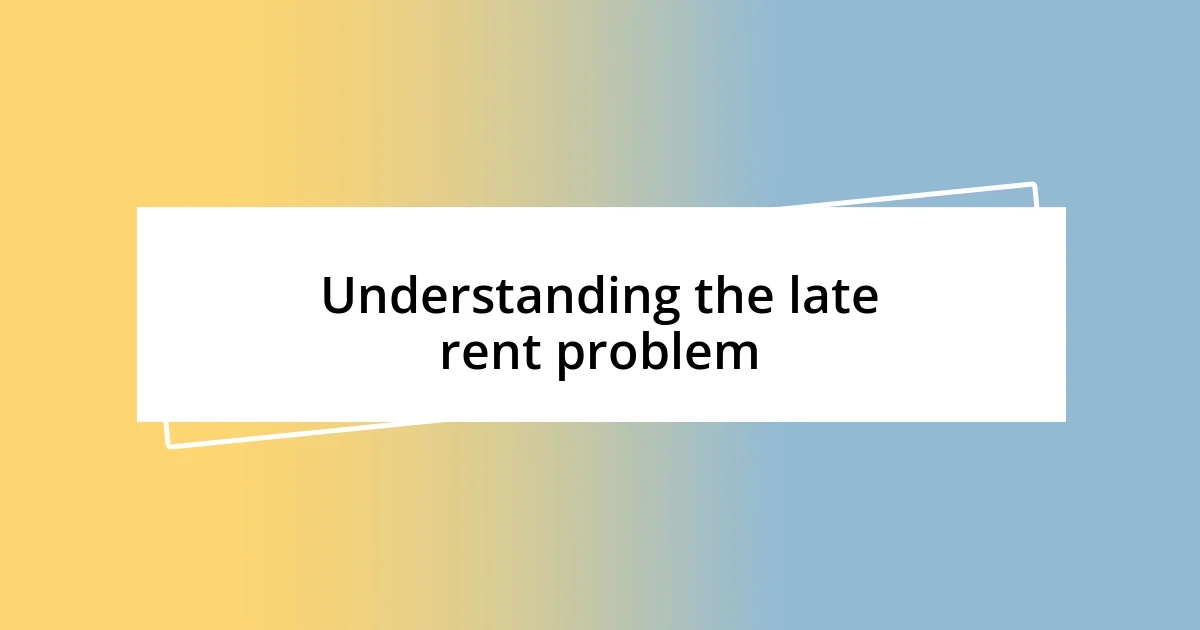
Understanding the late rent problem
Late rent payments are often more than just a financial issue; they can deeply affect the landlord-tenant relationship. I remember a time when a tenant of mine fell behind on rent due to unexpected medical expenses. This situation was eye-opening, reminding me that life can throw curveballs, and understanding the underlying reasons can bridge the gap in communication.
It’s crucial to acknowledge the emotional weight that comes with late payments. Have you ever worried about how to communicate with someone about money? I certainly have. The anxiety can be palpable for both landlords and tenants, often leading to misunderstandings and bitterness. By being empathetic and fostering open dialogue, we can tackle the problem together rather than let it fester.
Many tenants might feel embarrassed or ashamed to admit their struggles, which can create barriers. In my experience, when I reached out to my tenants with compassion rather than frustration, I found they were more willing to share their circumstances. This simple shift in approach transformed the conversation from one about late payments to finding solutions together. After all, understanding is the first step toward resolving conflicts and building trust.
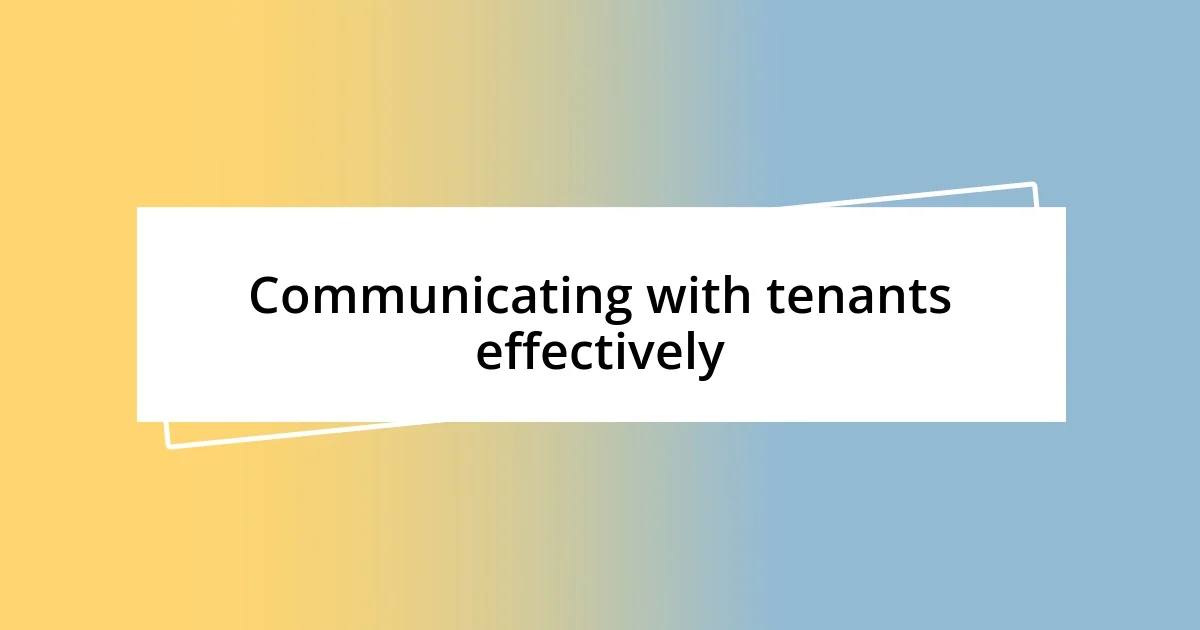
Communicating with tenants effectively
Building a robust line of communication with tenants is essential in managing late rent payments effectively. I’ve learned that setting a tone of openness from the beginning can make a huge difference. For instance, I once invited my tenants to a casual meeting where we could discuss any concerns or questions they had about their lease. This approach not only eased their anxiety about late discussions but also strengthened our relationship, making it easier for them to reach out during tough times.
To foster effective communication, consider these key strategies:
- Be proactive: Regular check-ins about their satisfaction with the property can create space for open conversation.
- Encourage honesty: Let tenants know they can share their financial difficulties without fear of immediate consequences.
- Listen actively: Show genuine interest in their concerns, which can help build trust.
- Follow up promptly: Acknowledging their issues quickly and with empathy shows that you care.
Tenants often carry a heavy emotional burden when payments are late. In one situation, I discovered that a simple follow-up text asking if everything was alright led to a heartfelt conversation about their struggles. This opened the door for a more compassionate payment plan, reminding me that communication is truly the foundation for understanding and resolving issues.
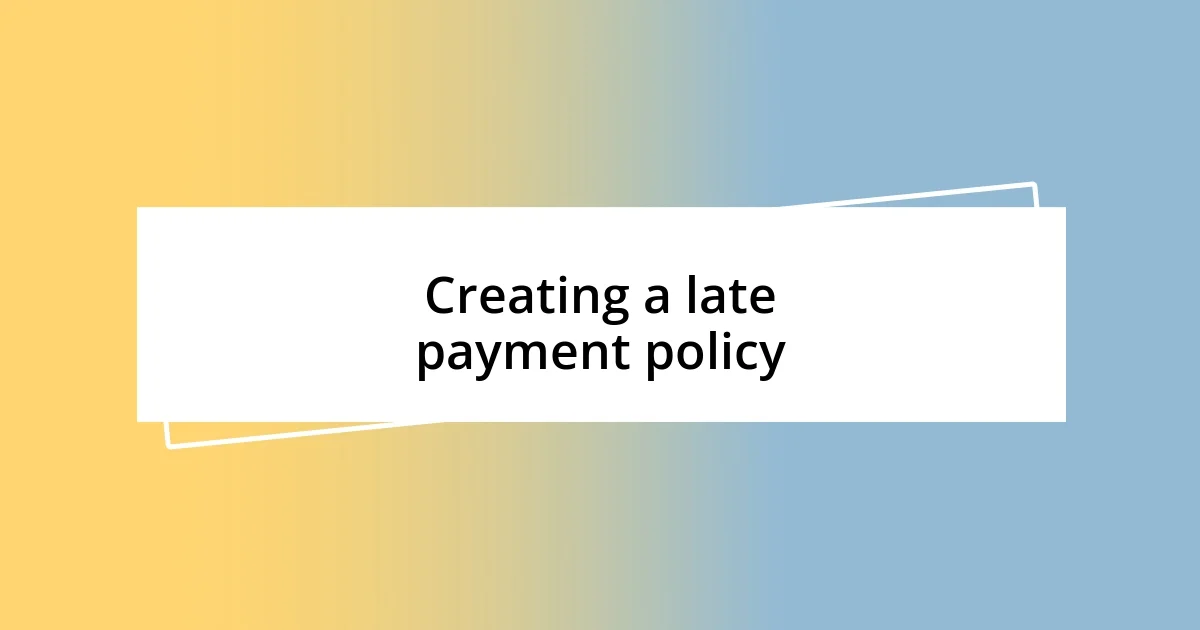
Creating a late payment policy
Creating a late payment policy requires careful consideration of various factors to ensure it’s both fair and effective. I recall when I first developed my policy; I was focused on balancing firmness with empathy. I decided to incorporate grace periods, giving tenants a little breathing room before penalties kicked in. This small change made a noticeable difference in tenant relations, allowing them to feel supported rather than pressured.
In my experience, a transparent late payment policy can drastically reduce confusion and stress. During my time managing properties, I learned that detailing the consequences of late payments, like fees or potential eviction, is essential—not just to outline the rules, but to help tenants understand the framework within which we’re operating. A clear policy can help renters make informed financial decisions. Over the years, I found the inclusion of flexible payment plans led to more positive interactions. It wasn’t uncommon for tenants to approach me with ideas for restructuring their payments, which fostered trust and accountability.
Here’s a comparison of different approaches to late payment policies:
| Approach | Description |
|---|---|
| Strict Policy | Penalties are imposed immediately after the due date. |
| Grace Period | A set number of days after the due date allows tenants to catch up without penalty. |
| Flexible Payment Plans | Options to restructure payments in cases of hardship, encouraging open communication. |

Offering flexible payment options
Offering flexible payment options has been one of my most effective strategies in handling late rent payments. A few years ago, a tenant approached me expressing anxiety about an unexpected medical expense. Rather than insisting on the full payment immediately, I proposed a staggered payment plan. This approach not only eased their stress but also reinforced the respect and trust between us. I find that small gestures like this can have a ripple effect; it encourages tenants to communicate rather than hide their financial troubles.
In my experience, flexibility goes a long way. I once had another tenant who was juggling multiple jobs to make ends meet. When they expressed difficulty in aligning their payment schedule with their income, I offered an option to pay biweekly instead of monthly. The relief on their face was palpable. I often wonder, how many tenants might simply give up without such options? By offering alternatives, I’ve seen tenants not only meet their obligations but also become more engaged and invested in maintaining their residence.
Listening to tenants’ stories has taught me that one size doesn’t fit all. I vividly remember one instance when a tenant suggested merging rent payments with their payday schedule. This simple tweak made all the difference, allowing them to feel in control of their finances. It’s moments like these that remind me the heart of rental management lies in empathy and accommodation. After all, isn’t it our duty to foster an environment where our tenants can thrive?
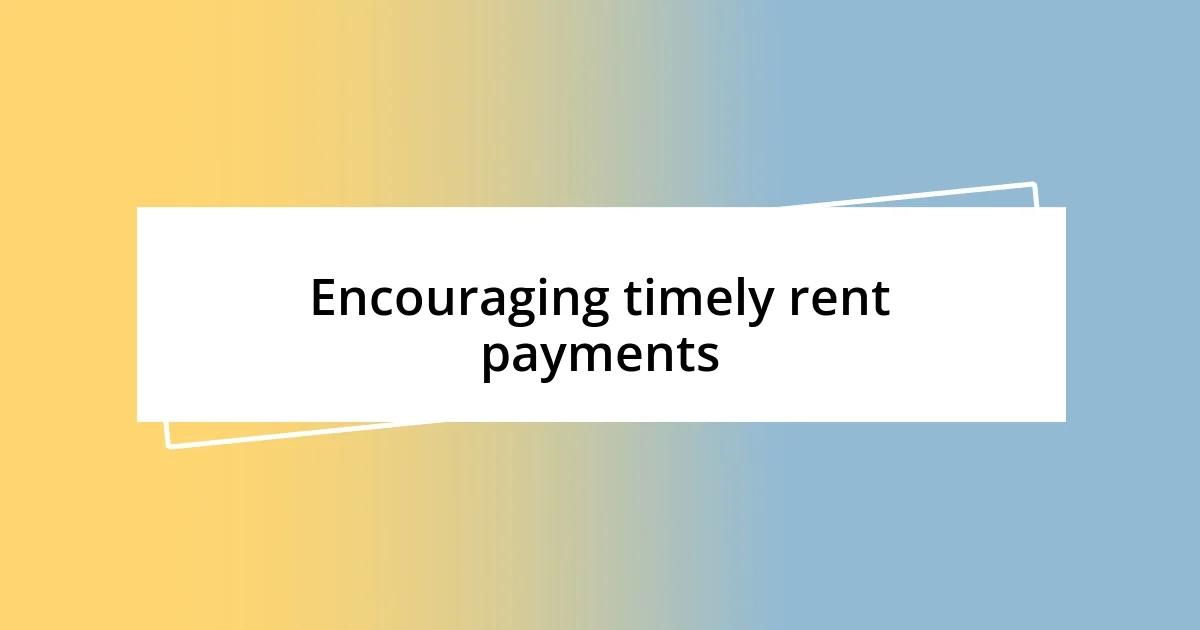
Encouraging timely rent payments
When it comes to encouraging timely rent payments, fostering open lines of communication is key. In my experience, I always made it a point to check in with my tenants regularly. I remember one tenant who initially struggled with managing their bills; after a casual conversation, we identified the root of their problem. They hadn’t realized the importance of setting reminders for themselves. That simple exchange worked wonders—after we discussed it, they made a habit of noting payment dates. It’s amazing how a little guidance can empower someone to take charge of their finances.
Incorporating incentives for early payments can also encourage promptness. I once experimented with offering a small discount for those who paid their rent before the due date. After implementing this, I noticed a shift in behavior; more tenants began to prioritize their payments. It felt rewarding to see them take proactive steps toward financial responsibility. Have you ever thought about how a small reward can lead to a big change? I found that this incentive not only helped my bottom line but also reinforced a sense of community among my tenants.
Moreover, transparency about the importance of timely payments has proven invaluable. I recall a situation where I hosted an informal coffee gathering for my tenants. During the discussion, I shared how their timely payments directly affected maintenance and property improvements. This insight made a profound impact. It was intriguing to hear them express newfound appreciation for the relationship between their prompt payments and the living environment. I realized then that when tenants grasp the bigger picture, they are more likely to feel invested in meeting their obligations. Isn’t it fascinating how shared understanding can strengthen relationships?












